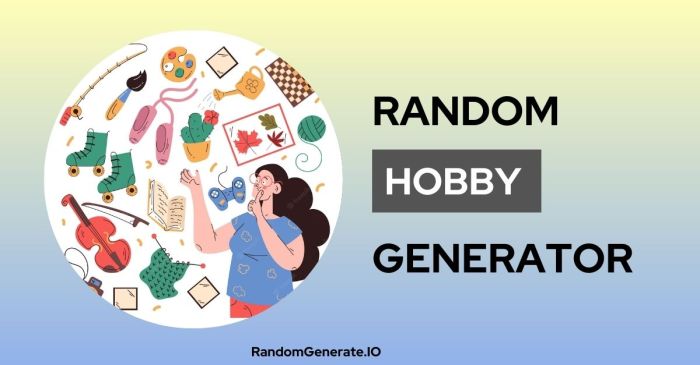Hobby Generator: Unlocking a world of leisure and self-discovery has never been easier. This exploration delves into the design, development, and marketing of websites dedicated to helping individuals find fulfilling hobbies. We’ll examine various approaches to hobby suggestion, from sophisticated algorithms to simple random selection, and discuss the user experience considerations crucial for a successful platform. The journey will cover everything from algorithm design and content creation to marketing strategies and the technical intricacies of building and maintaining such a website.
We’ll analyze the key features of a successful hobby generator, comparing different methods for generating suggestions and crafting user personas to guide the design process. Monetization strategies, crucial for sustaining any online venture, will also be explored, alongside a detailed look at the content creation process, emphasizing diversity and inclusivity in hobby selection. Finally, we’ll delve into the technical architecture, addressing scalability, security, and potential challenges in development.
Understanding “Hobby Generator” Websites

Hobby generator websites represent a burgeoning niche in the online leisure and self-improvement sectors, offering users a convenient and often personalized pathway to discovering new passions. Their success hinges on a blend of intuitive design, effective algorithms, and a clear understanding of user needs.
These platforms typically leverage various techniques to suggest hobbies, aiming to match individual preferences and lifestyles. Effective websites go beyond simple random selection, incorporating sophisticated algorithms and user input to enhance relevance and user satisfaction.
Typical Features of Successful Hobby Generator Websites
Successful hobby generator websites often incorporate several key features to maximize user engagement and satisfaction. These include a user-friendly interface, detailed hobby descriptions with accompanying images or videos (imagine, for example, a vibrant depiction of pottery wheel in action alongside a concise description of the craft), personalized recommendations tailored to user responses, a robust search function, and social features allowing users to share their experiences and connect with others pursuing similar hobbies.
The inclusion of a blog or resource section with relevant articles and tutorials further enhances the value proposition.
Comparison of Hobby Suggestion Generation Approaches
Three primary approaches exist for generating hobby suggestions: questionnaire-based, random selection, and algorithm-driven. Questionnaire-based systems, while effective in personalization, require significant user input. Random selection offers immediate results but lacks personalization, potentially leading to irrelevant suggestions. Algorithm-driven systems, leveraging machine learning and user data, offer a balance between personalization and efficiency, often providing more relevant and tailored recommendations. Consider, for instance, a system that analyzes a user’s interests, skills, and available time to suggest activities accordingly.
This approach, while more complex to implement, demonstrably improves user experience and satisfaction.
User Experience Design Considerations for a Hobby Generator Website
The user experience (UX) is paramount. A successful hobby generator website prioritizes intuitive navigation, clear and concise information presentation, and a visually appealing design. The site should be responsive across different devices (desktops, tablets, smartphones), ensuring accessibility for all users. A streamlined user journey, from initial interaction to hobby selection, is crucial for engagement. The incorporation of user feedback mechanisms, such as ratings and reviews, further enhances the platform’s ability to improve and refine its suggestions over time.
User Persona for a Typical User of a Hobby Generator Website
A typical user might be identified as Sarah, a 32-year-old marketing professional feeling burnt out from her demanding job. She seeks a creative outlet outside of work and has limited free time. Sarah is digitally savvy and prefers personalized recommendations based on her interests (e.g., a love for nature and a desire to learn a new skill). She values ease of use and access to information.
This persona informs design choices and content strategy, ensuring the website caters to the needs and preferences of its target audience.
Potential Monetization Strategies for a Hobby Generator Website
Several monetization strategies can be implemented, including affiliate marketing (earning commissions from recommending hobby-related products or services), subscription models offering premium features (e.g., access to exclusive content or advanced algorithms), display advertising (carefully targeted ads relevant to user interests), and premium hobby kits or workshops offered directly through the platform. A freemium model, offering basic functionality for free and charging for premium features, presents a viable approach, balancing accessibility with revenue generation.
From algorithmic design to marketing campaigns, building a successful Hobby Generator requires a multifaceted approach. This exploration has highlighted the critical interplay between user experience, data-driven suggestions, and a compelling content strategy. Ultimately, the success of any hobby-finding platform hinges on its ability to connect individuals with activities that resonate with their personalities, interests, and aspirations, fostering a sense of community and enriching their lives.
The potential for positive impact is immense, making this a truly rewarding area of development.

